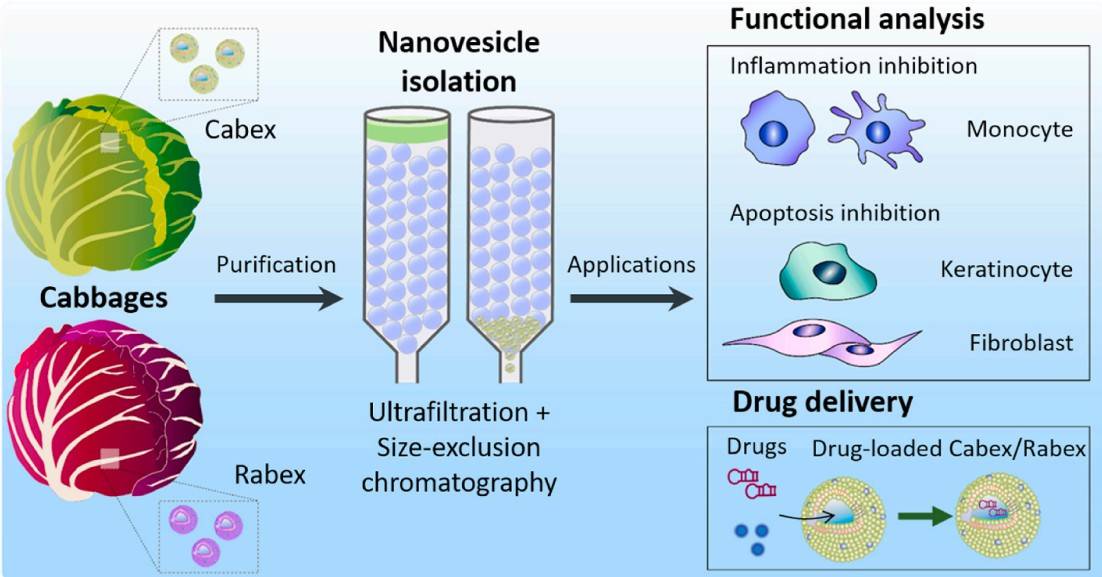Cabbage-derived Exosome Research and Application
There still remains a need for more in-depth research into the production and wider application of plant-derived exosomes. With the accumulated expertise in exosome research perspectives and advanced exosome technology platforms, Creative Biolabs can provide customized research services related to cabbage-derived exosomes to clients from all over the world.
Isolation of Cabbage-derived Exosomes
-
Wash fresh cabbages in distilled water to remove adhering impurities and pesticides.
-
Homogenize the cabbage through a blender to obtain cabbage juice.
-
Centrifuge at low speed to remove large cabbage pieces and then collect the supernatant.
-
Concentrate the cabbage juice using ultrafiltration devices.
-
Pack the cabbage juice through the size exclusion chromatography column, then elute with PBS and collect the cabbage exosomes.
Research on Cabbage-derived Exosomes
|
Research
|
Conclusion
|
|
Toxicity and proliferative effects of cabbage exosomes on cells.
|
Cabbage exosomes were not detected to be toxic to human epidermal keratinocytes, human dermal fibroblasts, and murine macrophages, and favored the proliferation of human epidermal keratinocytes and murine macrophages.
|
|
Anti-inflammatory activity of cabbage exosomes.
|
Cabbage exosomes can inhibit the expression of pro-inflammatory transcripts in lipopolysaccharide-stimulated murine macrophages and down-regulate the protein levels of L-6, IL-1β, and COX-2, thus exerting anti-inflammatory effects.
|
|
Effect of cabbage exosomes on apoptosis.
|
Cabbage exosome supplementation reduced staurosporine treatment-induced apoptosis in human epidermal keratinocytes and human dermal fibroblasts, and significantly inhibited caspase-3 activation to protect the cells from stress, thereby rescuing cell viability.
|
|
Cabbage exosomes as delivery vehicles
|
Cabbage exosomes can efficiently encapsulate miR-184 and deliver into colon cancer cells to regulate their target miRNA levels. In addition, the role of cabbage exosome-loaded chemotherapeutic drugs in cancer treatment has been proven in in vitro cellular experiments.
|
Functions of Cabbage and Related Exosomes
|
Cabbage
|
Cabbage-derived exosomes
|
-
Cabbage has a variety of health benefits, such as strengthening the muscles and bones, regulating the organs, and relieving pain.
-
Cabbage can be antioxidant and anti-aging, and is one of the vegetables with a high content of folic acid.
-
Cabbage serves to inhibit the synthesis of carcinogens, promote metabolism, and favor physical development.
|
-
Cabbage exosomes regulate cell proliferation and apoptosis.
-
Cabbage exosomes exert anti-inflammatory effects by affecting the levels of inflammation-related molecules.
-
Cabbage exosomes act as carriers to deliver nucleic acids and drugs.
-
Cabbage can be used for vaccine preparation after encapsulating active components such as antigens or antibodies of pathogens.
|
 Fig. 1 Isolation of cabbage-derived exosomes and their functions.1
Fig. 1 Isolation of cabbage-derived exosomes and their functions.1
Besides carrying generic plant vesicle components, cabbage-derived exosomes may also be encapsulated with nutrients rich in vitamin C, vitamin B6, folate, and potassium from their donors, making them valuable as novel biomaterials for research and translation. Creative Biolabs is committed to providing exploratory services to support the production and research of cabbage-derived exosomes, and to provide reliable data references for related projects. Please contact us with your requirements.
Reference
-
You, Jae Young, Su Jin Kang, and Won Jong Rhee. "Isolation of cabbage exosome-like nanovesicles and investigation of their biological activities in human cells." Bioactive materials 6.12 (2021): 4321-4332.
For Research Use Only. Cannot be used by patients.
Related Services:

 Fig. 1 Isolation of cabbage-derived exosomes and their functions.1
Fig. 1 Isolation of cabbage-derived exosomes and their functions.1









